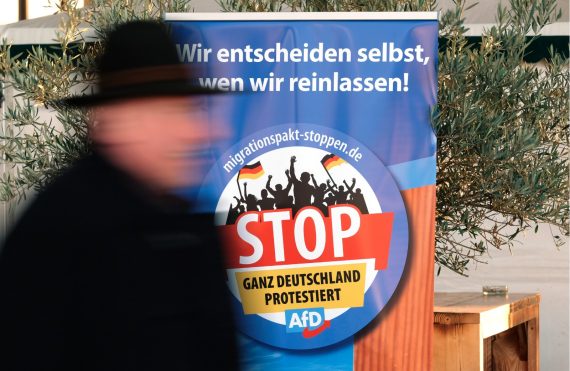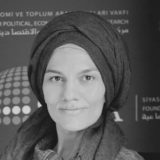The isolationist and protectionist policies of the U.S., the rising influence of Russia and the rise of China are considered as clear signs that the current global system is in a serious crisis. The operational weaknesses of international organizations such as the UN as well as increasing attempts at finding alternatives to them shows that international organizations are also under stress. The Eurozone crisis, the ongoing fiscal crises in Italy and Greece and the matter of refugees have lead people to think that Europe as a whole is also in crisis.
While social and political movements have increasingly gained momentum in Germany, the existing dominant structures and political parties have continued to lose power and influence. It’s the first time since the Weimar Republic that the German public are mentioning a crisis of democracy and the liberal system this often. As a result of the waves of refugees that were caused by the Syrian Civil War and especially Merkel’s “We will manage” principle and open door policies, the public no longer refers to a “refugee problem” but a “refugee crisis.” Thus, this crisis led to a fast erosion of power for centrist parties leading German politics, the CDU and SPD, and Merkel from losing their positions.
The peculiar aspect of this situation is that while Germany seems to be in a period of economic prosperity with low unemployment rates and a high budget surplus, it is reflecting the image of a country under many crises. Especially at this point it can be said that Germany, which has managed to maintain its stability even through the 2008 crisis, is not undergoing an economic but a social, political, and ideological crisis. The leading indicator of this crisis is the faltering trust in the existing political power structure and the shift in public preference towards political and social movements that present themselves as alternatives to the existing system and centrist political powers such as the CDU and SPD, which have failed to find themselves an ideological orientation and identity.
The leading indicator of the crisis in Germany is the faltering trust in the existing political power structure and the shift in public preference towards political and social movements that present themselves as alternatives to the existing system.
Loss of trust and a search for alternatives: Has liberal democracy reached its limits?
Unlike the 20th century, it cannot be stated that any great social movement or political change has occurred in Europe in the 21st century. However, anti-establishment social movements of this age, considering them as being results or parallels of recent far-right parties in Europe and social movements such as Five Star in Italy and Pegida in Germany, have at their heart nationalist, protectionist, and far right doctrines. According to a poll in Germany, the results of which were announced in October, AfD has for the first time reached 18% of total votes, and with SPD’s votes decreasing to 15%, the AfD has become the second most popular party in Germany after the Christian Democrats.
It is now better understood that AfD’s success in the 2017 general elections was not a one-off and temporary political reaction. Taking into account fundamental changes in the global arena, the rise of far right and nationalist discourse as well as isolationist policies, not only in Germany through AfD, but in Europe and around the world, can be considered not a temporary phenomenon but a manifestation of the objection and distrust felt towards the existing political, social, and economic order.
The ideological aspect of the political crisis in Germany also needs to be considered. It can be seen that the public is gravitating towards peripheral parties developing new discourses, offering the public something new on the basis of ideology and identity, rather than parties offering to maintain the status quo.
According to a poll in Germany, the results of which were announced in October, AfD has for the first time reached 18% of total votes, and with SPD’s votes decreasing to 15%, the AfD has become the second most popular party in Germany after the Christian Democrats.
The loss of trust in existing centrist parties among the German public is a clear expression of a desire for change. The strength of this desire for change can be evaluated by looking at the successes of peripheral political organizations that offer the public no solid program but merely project an image of being new and an alternative option. This is how AfD, despite offering no concrete programs or solutions for the problems of the country in its party program, has managed to become the second most popular party among the public. Similarly, the fact that the Greens, which had once emerged as an alternative, is again on the rise can be explained by this framework of “search for an alternative” discourse. While far right groups politically blame the centrist parties, socially they prey on the weakest and culturally most distant groups – namely, foreigners and refugees – in order to project an image of unity and belonging.
According to the Indian intellectual Pankaj Mishra, author of the book Age of Anger, both far right organizations around the world that question the existing political structures, as well as terrorists and people with radicalization tendencies, reflect the anger of individuals and societies that feel betrayed by liberal democracy. According to the author, who claims that while liberal Western democracies promise that “Everyone can live in prosperity and have equal rights” they’ve failed to make this a reality, such pursuits are aimed at the liberal democratic stance and institutions that have failed to deliver on their promise. Among those who have lost their trust and faith in these structures, those who seek a solution within the system gravitate towards the most “alternative” and new among the existing movements, while those who seek a solution outside the system and feel relatively powerless tend towards terror and radicalization.
Crisis of representation: “The public” or “the economic, media and political elite”?
While talking about the crisis of democracy in Germany, it can be said that this in some part is a crisis of representation and is not only happening in Germany but also in other European countries governed by liberal democracy. The plainest way to explain this crisis of representation is that great masses of the public are unable to see their influence exerted on political decision mechanisms and ultimately political actions.
Recommended
The current crisis in Germany is a representation of what is also happening in other European countries governed by liberal democracy. The explanation for this is because the public do not see themselves as part of the decision making mechanisms.
It can be stated that the effects of elections and ruling parties on political decisions has been continuously decreasing. The fates of people living in European countries are determined more by decisions made in EU commissions than by their national parliaments, moreover pressure is exerted on elected governments by international financial centers, experts, courts and the bureaucratic elite, “independent” NGOs financed by certain groups and the media.
On this issue some political scientists in the west talk about the “democratization of democracy.” Arguments such as the claim that existing institutional political tools and mechanisms, along with the media cartel, are only being used to manipulate democracy by a small group of financially powerful people to maintain the current system for their own interests, are gaining traction.
Considering that global-scale decisions are shaped according to the opinions of certain groups with shared interests and credit centers, public masses that think their own interests are not represented in this system tend to prefer far right organizations such as the AfD, which presents itself as an alternative rather than the centrist parties which have been enablers of the system.
The social contract
It is known that the idea of liberal and modern democracy is built upon the ideal of a “social contract.” Liberal democracies foresee that under a legal unity and a social contract, groups with heterogeneous political, social and economic beliefs can peacefully coexist. Habermas’s thesis of “Deliberative Democracy” emphasizes this culture of discussion and consensus, stating that democracy in essence is better characterized by the process of reaching a consensus through discussions among the public with contribution from groups with differing interests and social statuses, than simply voting to approve predetermined decisions.
But considering the fact that conventional media tools, which are controlled by certain powerful families operating on the global scale, paint a surprisingly homogeneous picture of reality, along with the existence of a monopoly on manipulation and information, the culture of discussion Habermas has foreseen cannot be said to be functioning today. For example, had it not been for the anti-refugee campaigns of the German mainstream media that turned the refugee matter into the refugee crisis, would an average German person still be as afraid of Muslims, foreigners and refugees as they are today? According to a poll conducted by FORSA, 84% of the German public have not experienced a problem with their foreigner neighbors. Specifically in Germany, the discussions on Leitkultur are important in that they show the limitations of the ideas of freedom, liberalism and the neutral state.
On one hand, individuals separated from their traditional social structures are being promised freedom and equality by the liberal system and modernism, on the other hand within the framework of a social consensus and constitution they are expected to find unity.
Had it not been for the anti-refugee campaigns of the German mainstream media that turned the refugee matter into the refugee crisis, would an average German person still be afraid of Muslims, foreigners, and refugees as they are today?
What then will be the values that are supposed to keep the public and society united? Will individuals separated entirely from their tradition via enlightenment and promised freedom, equality and rule of law be able to find anything other than an image of a common enemy, foreigners, to reunite themselves as a nation?
Within this context, through AfD and other far right groups, the discussions on how much democracy can “democracy” tolerate and the limitations on the ideas of freedom and equality have been rekindled. While the rule of law and a binding constitution are supposed to ensure that democracy will prevent movements against it, if one day far right organizations such as the AfD become partners of a ruling coalition through elections, no one will be able to object to the situation by claiming that it is against democracy.
Thus while some experts work to determine the limits of democracy by the rule of law format, the rule of law itself needs to be built on democratic and liberal principles. At this point, the claim of the Enlightenment that the hegemony of mind will be shaped by rational governments and rational demands of mature citizens seems shaky.
Similarly, the immigration of new social groups who make religious references in their everyday life, which has no rationality according to European society, to Europe presents a new dilemma for the secular-liberal Western democracies. While this clash can for now temporarily be ignored, this is not a possibility in the long term. The greatest example of this is how Muslim minorities are only able to gain their democratic rights via vegans who have established a place for themselves on the basis of rationality, and some of their freedoms through laws passed for the interests of LGBT groups.
It does not seem possible for the current crisis of the liberal system and democracy to be resolved within the framework of the rule of law and by ignoring the far right element without re-directing the system into a new direction and developing an alternative, new discourse.





